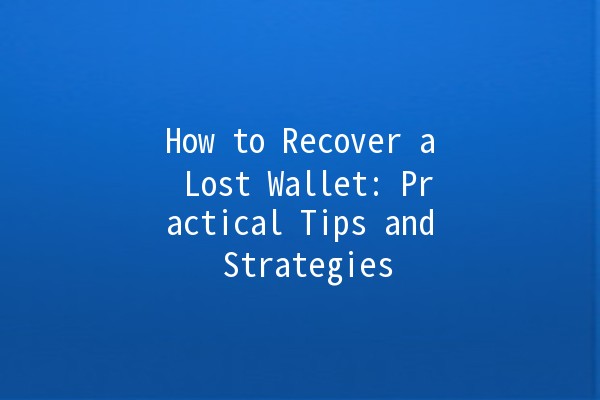




Losing your wallet can be a distressing experience, filled with anxiety about potential identity theft and how to retrieve your important belongings. Whether it's your ID, credit cards, or even cash, a misplaced wallet can lead to significant stress. This article aims to provide practical steps and strategies to help you navigate the unfortunate situation of losing your wallet, while also offering insights into how to prevent such incidents from happening in the future.
When your wallet goes missing, the first thing to remember is that you are not alone. Many individuals face this situation, and there are various approaches to handle it. Understanding the significance of acting quickly can make a crucial difference in the recovery process.
The first step is to take a deep breath and avoid panicking. Panic can cloud your judgment and make it difficult to think clearly. Here’s how to assess the situation:
Retrace Your Steps: Think about where you last had your wallet. Did you visit a store, coffee shop, or any public transport? Work on a timeline of your movements.

Search Your Surroundings: Look in the immediate vicinity. Check sofas, car seats, or any bags you might have brought with you.
Ask Around: If you were in a public place, ask employees if they have seen your wallet or if it has been turned in.
If you were at a local café, speak with the barista and check the lost and found. Many establishments have a policy of keeping lost items for a certain period.
As soon as you determine your wallet is truly lost, it’s critical to safeguard your finances. Here’s what to do:
Contact Your Bank: Notify your bank immediately. Most banks have protocols in place to prevent unauthorized transactions and can freeze or monitor your accounts.
Check Your Transactions: Look out for any suspicious activity to report to your bank. This is essential in preventing potential fraud.
If your wallet contained credit cards, call the issuing bank to cancel your cards and request replacements. They can often issue new cards immediately or within a few days.
In cases where personal identification is lost, reporting to the authorities is essential. This not only protects you but also provides a record that may be useful later.
File a Report: Report the loss with your local police. This is particularly important if you believe your wallet was stolen.
Obtain a Copy: Ensure you get a copy of the report for future reference, especially for claims or disputes with financial institutions.
If your ID was stolen, having a police report can help in establishing legitimacy when you apply for a replacement.
Beyond worrying about identity theft, you'll need to focus on getting your important documents replaced. This involves several steps but is necessary.
Driver's License/ID: Visit the Department of Motor Vehicles (DMV) for a replacement.
Credit/Debit Cards: As mentioned, contact your bank to handle this.
Insurance Cards: Contact your health and car insurance companies to obtain new cards.
Membership Cards & Reward Programs: Check in with any clubs or services you were a member of.
If your driver's license was in your wallet, you can often complete the replacement process online through the DMV’s website, which can save time.
Once you have taken the necessary steps to recover and replace your belongings, consider implementing strategies to prevent future wallet loss.
Using a Wallet Tracking Device: Consider investing in a Bluetooth wallet tracker that can help locate your wallet through an app.
Minimalist Wallet: Carry only what you need. Reducing clutter decreases the chances of losing it.
Secure Storage: Use a secure location when not in use, such as a designated pocket or purse compartment.
Devices like Tile can make it easier to locate your wallet through your smartphone, significantly reducing the stress of losing it again.
If your wallet is stolen, immediately contact your bank to block your cards and report the incident to the police. They may require details to file a report, which will help in case of identity theft.
To protect yourself, monitor your bank statements regularly, opt for identity theft protection services, and make sure to use unique passwords for credit accounts.
Once you find your wallet, contact your bank to reactivate your accounts if possible. Check your new cards for any unauthorized transactions.
Unfortunately, cash and gift cards can rarely be recovered once lost. However, if you lose a gift card linked to an account, contact customer service for assistance.
To replace lost IDs like your driver’s license, visit the relevant government website as many allow you to apply for a replacement online. You may need documents proving your identity.
Practice mindfulness when handling your wallet, invest in a tracking device, and develop a routine of checking for your belongings before leaving any location.
By following the above strategies and tips, recovering a lost wallet doesn’t have to be an overwhelming experience. Being proactive, organized, and calm can significantly enhance your chances of recovery and ensure your peace of mind.